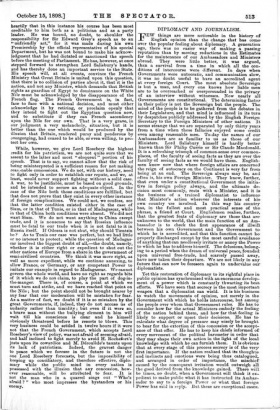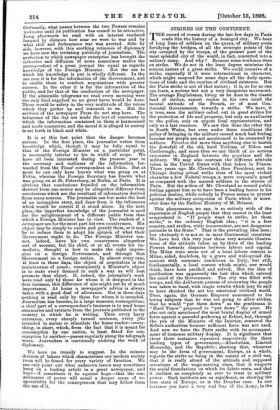DIPLOMACY AND JOURNALISM. F EW things are more noticeable in the
history of English opinion than the change that has come over the popular feeling about diplomacy. A generation ago, there was no easier way of making a passing reputation than by moving reductions in the Estimates for the maintenance of our Ambassadors and Ministers abroad. They were little better, it was argued, than a survival from a time in which all the con- ditions of intercourse were different. In days when Governments were autocratic, and communication slow, it was no doubt useful to have an accredited agent at every foreign Court. The most absolute Sovereign is but a man, and every one knows how liable men are to be overreached or overpersuaded in the privacy of an interview without witnesses. Now nearly all Governments are constitutional. The determining factor in their policy is not the Sovereign but the people. The mind of the people is to be gathered from the debates in their Legislature, and that mind is influenced in its turn by despatches publicly addressed by the English Foreign Secretary to the Foreign Ministers of other nations. It seems strange that we are separated by only thirty years from a time when these fallaeies enjoyed some credit even among reasonable men. To-day the names of our Ambassadors are as familiar to us as those of our Ministers. Lord Salisbury himself is hardly better known than Sir Philip Currie or Sir Claude Macdonald. It is a refreshing triumph of common-sense over common- places, of the faculty of seeing facts as they are over the faculty of seeing facts as we would have them. English- men know now that where foreign affairs are concerned the reign of autocracy on the Continent is very far from being at an end. The Sovereign always may be, and often is, his own Foreign Minister. They know, further, that even under a constitutional Government the initia- tive in foreign policy always, and the ultimate de- cision most commonly, rests with a Minister, and it is the business of a trained diplomatist to influence that Minister's action wherever the interests of his own country are involved. In this way his country has, in the fullest and most practical sense of the phrase, a friend at Court. Englishmen realise, further, that the greatest feats of diplomacy are those that are unknown to the world, that the main function of an Am- bassador is to check the first appearance of illwill between his own Government and the Government to which he is accredited, and that this function cannot be properly discharged except by the most careful avoidance of anything that can needlessly irritate or annoy the Power to which he has to address himself. The delusions, belong- ing to a period when the dream of universal peace, founded upon universal free-trade, had scarcely passed away, have now taken their departure. We are not likely in any future that can now be foreseen again to undervalue our diplomatists.
Yet this restoration of diplomacy to its rightful place in public opinion has synchronised with an enormous develop- ment of a power which is constantly thwarting its best efforts. We have seen that secrecy is the most important weapon that a diplomatist can wield. It is his business to watch the movements of opinion, not merely in the Government with which he holds intercourse, but among the people over whom that Government rules. He has to consider how far the actual Ministers embody the feeling of the nation behind them, and how far that feeling is likely to support or upset their decisions. He has to calculate what degree of pressure may wisely be brought to bear for the extortion of this concession or the accept- ance of that offer. He has to keep his chiefs informed et every movement of the political barometer in order that they may shape their own action in the light of the local knowledge with which he can furnish them. It is obvious that at every stage of this process secrecy is of the very first importance. If the nation realised that its thoughts and instincts and emotions were being thus catalogued,. and arranged in order of importance, the mischieE caused by the consequent irritation would outweigh all the good derived from the knowledge gained. There will be times, no doubt, when a Government will think it ex- pedient to make public what it has instructed its Ambas- sador to say to a foreign Power or what that foreign Power has said in reply. But these are exceptional eases. Ordinarily, what passes between the two Powers remains unknown until its publication has ceased to be attractive. Long afterwards we read with an interest rendered languid by distance how near we were to war and by what skill and forbearance war was averted. Side by side, however, with this soothing reticence of diplomacy we have now the irritating publicity of journalism. The perfection to which newspaper enterprise has brought the collection and diffusion of news sometimes makes the correspondent of a great journal the equal as regards knowledge of the Foreign Minister. But the use to which his knowledge is put is wholly different. In the one case it is for the information of the Government, and to enable them to conduct negotiations with greater 'success. In the other it is for the information of the public, and for that of the conductors of the newspaper. If the admirable telegrams we read every morning were the only food supplied us no great harm would be done. 'There would be safety in the very multitude of the voices -which they gather up and transmit to us. But the services of the newspaper Press do not stop here. The telegrams of the day are made the text of comments in which the information contained in them is harmonised and made consistent, and the moral it is alleged to convey is set forth in black and white.
It is at this last point that the danger becomes serious. In the first place, the journalist writes from knowledge which, though it may be fully equal to that of the Foreign Minister on a particular point, is necessarily inferior to his in width of scope. We have all been interested during the present year in the accuracy and earliness of the information for- warded from the Times' correspondent at Pekin. But at most he can only have known what was going on at Pekin, whereas the Foreign Secretary has known what was going on at St. Petersburg, at Berlin, at Paris. It is 'obvious that conclusions founded on the information derived from one source may be altogether different from .conclusions which are the resultant of information derived from many sources. The journalist can but make the best of an incomplete story, and draw from it the inferences which would be correct if it stood alone. In the next place, the imperfect knowledge of the journalist is used for the enlightenment of a different public from that which a Foreign Minister has in view. The readers of a ..newspaper are for the most part his own countrymen. His object may be simply to excite and gratify them, or it may be to induce them to adopt his opinion of what their Government ought to do. The Foreign Minister can- not, indeed, leave his own countrymen altogether 'out of account, but his chief, or at all events his im- mediate, thought is how to make the right impres- -sion on a foreign Government, and through that 'tovernment on a foreign nation. In almost every case, at least in these days, the object of negotiation is the maintenance of peace ; consequently a Minister's object is to state every demand in such a way as will best promote that object. If, indeed, the journalist's work were read only by those for whom it is designed in the first instance, this difference of aim might not be of much importance. At home a newspaper's advice is always taken with a good deal of allowance. But in these days nothing is read only by those for whom it is intended. Journalism has become, in a large measure, cosmopolitan; a chief part of a correspondent's business is to send home summaries and extracts from the journals published in the -country in which he is writing. Thus every hasty 'utterance, every sharply turned sentence, every jibe intended to amuse or stimulate the home reader—every- thing, in short, which, from the fact that it is meant for consumption by one nation, is least fitted for con- sumption by another—passes regularly along the telegraph wires. Journalism is continually undoing the work of ,diplomacy.
We have no remedy to suggest. In the minute -division of labour which characterises our modern society room will be found for every variety of function. We can only point out what unknown issues may sometimes hang on a leading article in a great newspaper, and hope—if sometimes it be against hope—that the con- sciousness of power will entail a deeper sense of re- sponsibility for the consequences that may follow from the use of it.







































 Previous page
Previous page